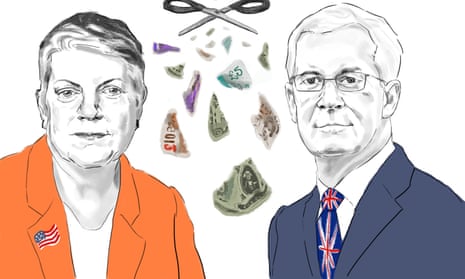Vice-chancellors in Britain are united in the view that this is the most challenging time to run a university in modern history. They are fighting to limit the damage of Brexit, which they fear will hit their recruitment and retention of great staff and students, crush vital research collaboration, and remove billions of pounds of funding. They are also wrestling with the likelihood of a major cut to tuition fees, with little hope in the sector that the government will plug the gap.
Last month in the US, Donald Trump proposed significant cuts to higher education funding in his 2020 budget, including reductions to student financial aid, and big cuts to the budgets of the two biggest public funders of research, the National Science Foundation and the National Institutes of Health. This follows major cuts in the aftermath of the economic crash of 2008-9, after which many universities ramped up their fees considerably.
In the final instalment of our 2VCs discussion series, Anna Fazackerley spoke to Janet Napolitano, President of the University of California, and Prof Hugh Brady, vice-chancellor of the University of Bristol, about enduring cuts and what the current political climate means for universities.
The University of California is a network of research institutions in America’s largest state. It has 10 separate university campuses, nine of which take undergraduates, including Berkeley and the University of California LA (UCLA). It also runs five medical centres and three national science laboratories, and has an operating budget of $36.5bn. Napolitano was the US secretary of homeland security under the former US President, Barack Obama, and has had a distinguished career in politics.
The University of Bristol is a member of the elite Russell Group of research-intensive universities. It was the first UK university to announce its intention to expand when the government removed the cap of student numbers, and has increased its student population by 30% since 2012. Although born in Ireland, Brady spent a decade working as a physician-scientist in America. Before joining Bristol he was president of University College Dublin.
Brady points out that unlike public universities in America, British universities were pretty well insulated from the economic crash of 2008-9. He says this is largely because “the British government has until recently been robust in its view that higher education should be adequately funded”. But he warns: “I think that is changing. It is no exaggeration to say that UK HE is facing a perfect storm.” He describes the storm as having five fronts: Brexit; the erosion by inflation on frozen tuition fees; a possible major cut to fees in the prime minister’s post-18 funding review; an immigration policy that puts Britain at a competitive disadvantage; and uncertainty around the forthcoming comprehensive spending review.
“It is a dangerous time for UK universities, at the exact time when we need our universities to be more vocal and more effective than ever before, both in bringing civility back to society but also in driving economic growth,” Brady says. He insists that universities like Bristol will weather the storm. “But will we be able to compete with top US research-intensives like the University of California if we are running on fumes?” he asks. “You’ve got to say it’s highly unlikely.”
For many academics in the UK, one of the most upsetting aspects of the Brexit debate has been a growing mistrust of experts. Brady describes this “disdain” as deeply problematic, but points out that universities are facing a similar backlash “in the world of Trump” on the other side of the Atlantic.
Napolitano agrees vehemently. “The scepticism about climate change from President Trump is not just about climate change. It is really an attack on science and the value of validated scientific research. It shows a lack of understanding about how research is conducted and what constitutes findings that are supportable and data-driven.” Against such a backdrop she argues that it is hard to spread the message that the research your staff are doing contributes to things like better health or agriculture. And ultimately it is hard to argue for extra cash. “If the leader of the country is devaluing what you are doing, it is hard to get greater public support in the form of dollars.”
Is there similar uncertainty in the US?
Napolitano says she is grateful that the new governor of California has put more money into her university this year, but notes that tuition fees will be frozen again despite increasing costs. She argues that further cuts would be “very damaging”.
Napolitano explains that in California, demand for higher education has been growing as the population has increased – but the funding hasn’t been there to increase capacity in the state’s universities. “We are cramming students into our campuses and are at risk of sacrificing quality – not necessarily in terms of instruction, but in terms of the overall student experience,” she says. This means that they are now more likely to be squeezing three students into a dorm room instead of two, for example.
Echoing the narrative from some quarters in the UK that universities are wasting money – particularly on excessive vice-chancellors’ salaries – Napolitano adds that she has to face down “constant” accusations that her university is squandering money on a “bloated” administration. But she argues that they have already made hundreds of millions of dollars of cutbacks and efficiency savings in recent years – and as a large organisation they simply need a complex infrastructure to operate well.
What will cuts mean for your university?
Brady is quick to stress that Bristol and its Russell Group counterparts have also been delivering efficiency savings over the past five years. But he is clear that the implications of the financial missiles heading for UK universities now will be far-reaching and long-lasting.
He says that “without a doubt, much of the good work that has been done to widen access to universities will be undermined”, with universities forced to make cutbacks to widening participation programmes. In addition institutions will have to curtail ongoing investment in their buildings, in pastoral care, and other areas of student support.
Napolitano says the picture will be similar at her university. “The whole menu of student support services, mental health care, different types of student centres, academic advising, these are all things that could be impacted.” She adds that 42% of UC’s undergraduates are now the first in their family to go to university. Evem though fees have gone up significantly, a generous student aid package means that 57% of undergraduates from California don’t pay any tuition because they come from lower-earning families. “That kind of access and affordability requires continued public investment,” she says.
Brady agrees that cuts will have serious impacts beyond the student experience. He says universities’ ability to contribute to the government’s industrial strategy will be compromised, because both the skills pipeline and universities’ research capacity would be seriously damaged. Although Bristol isn’t running a deficit, Brady points out that it is no secret that many British other universities are. He is concerned that many of the most financially stretched universities are the largest employers in towns that are already struggling. “There is a very real danger that proposed cuts would tip those institutions towards closure and I think the consequences in those regions would be seismic.”
Won’t universities be seen as self-serving if they say they can’t sustain any cuts?
“Yes we will be accused of that,” Brady agrees. “But we can’t shy away from the fact that higher education and research is a deep-pockets game where there is more international competition than ever before, and where there will be winners and losers. We just can’t afford for the UK to be on the wrong side of that equation.”
Have we lost sight of why higher education is a public good?
This is something that worries both presidents. Napolitano thinks universities have “underplayed” the wider returns to society, and how higher education boosts not only our economies and innovation, but also strengthens communities and families. “When everything gets measured transactionally – ‘I pay this much for my education and I will make this much’ – you lose sight of that other important function.”
Brady says a similar thing has happened in the UK, “driven by voices at the heart of government which focus on marketisation and value for money, and on the value of a university degree being judged purely on the salary you come out with”. He describes Bristol as a case study of how a university can power the regional economy. Most of the university’s students come from outside the city, but 40% stay on after graduating or return later in their careers, fuelling the local economy and changing the shape of the city by doing things like sitting on school and hospital boards.
How pessimistic do you feel about what lies ahead for universities?
Brady describes himself as a realist, not a pessimist. “[Universities] are resilient institutions full of smart, thoughtful, creative people who are determined to advance humankind.” He feels encouraged by knowing that the research coming out of universities is changing the face of medicine, coming up with new solutions in areas such as food security, sustainable energy and transport, and challenging how we think about difficult areas like migration and wealth distribution.
And students give him cause for optimism. “I think they are becoming more engaged than our generation ever was. Sure we had some great marches, but I’m not sure we were as thoughtful and nuanced as the current cohort of students.”
I wonder whether Napolitano can find anything to be optimistic about when she is so opposed to Trump’s direction of travel. But she counters that California is its own place – if it were a country it would be the world’s fifth largest economy. “Nonetheless we have to navigate a challenging budget environment,” she says. “I think we have to continue to emphasise that public universities deserve public investment because we are a public good. We can’t just sit back on our heels and presume the taxpayers are going to fund us because they all understand how great we are. We have to continue to fight and make the case.
“Universities are wonderful accumulations of talent with a wonderful mission,” she adds. “And that gives me a sense of guarded optimism.”
Janet Napolitano

What was your first degree and where did you study?
Political science at Santa Clara University.
What advice would you give your 18-year-old self?
Don’t think of your future as a straight line, but rather as one that will zig and zag as new opportunities arise.
What book is on your bedside table?
The Border by Don Winslow.
How do you switch off after a stressful day?
I always try to read something non-work related before I turn in for the night.
What’s your secret vice?
I occasionally binge on ice cream. Vanilla with chocolate sauce is a real favourite.
What do you most admire about the UK?
While in college, I lived in London during a semester abroad and grew to admire the pubs and the tube system. I lived on the Central line and I still remember my stop: Lancaster Gate. I also admire that the prime minister regularly goes to parliament to take questions from members. One can only wonder what would happen if President Trump did the same thing with our Congress!
Hugh Brady

What was your first degree and where did you study?
Medicine at University College Dublin.
What advice would you give to your 18-year-old self?
Follow your passion.
What book is on your bedside table?
Stephen Greenblatt’s The Rise and Fall of Adam and Eve.
How do you switch off after a stressful day?
Sleep! There’s not much time in a vice-chancellor’s day to do much else.
What is your secret vice?
Golf – perhaps not so secret but finding too little time to play.
What is your favourite thing about the US?
Balmy summer evenings in Fenway Park!
